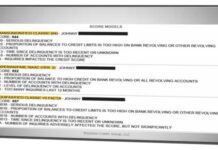Removing Public Record Information from Your Report.
Public Record Information is reported to Experian, Equifax, and Transunion by a data collection firm called LexisNexis. This is important to note because this simple fact presents you with an opportunity to have certain public record information removed from your credit reports with Experian, Equifax, and Transunion. Remember, under the Fair Credit Reporting Act, the information maintained within your credit report must be complete, accurate, and can be verified. When you dispute an item on your credit report that the dispute gets processed electronically using software called e-oscar.
Your credit report needs to correctly document who provided the information to the credit bureau. When it comes to public record data it often lists the furnisher as Recorder of Deeds, Clerk of Courts, Municipal Court, or Magistrate. This is where there is a chance for you to have the information removed.
The courts have told readers of this book, and many others, that they do not provide or furnish information bureaus. So why do the credit bureaus list the courts as a provider? Great question! LexisNexis may have sourced the public information from the court. It is not the agency that directly provides that information to the bureaus. How it works is, that LexisNexis “mines” all the public record details from all accessible public portals and then sells that information to Experian, Equifax, and Transunion. Provide data!
Getting the public record removed
Regardless, you now have the chance to have the public record removed at the credit bureau level. Here is what you need to do:
- Write a letter to the right Clerk of Courts
- In the letter request, the procedure used to verify records with Experian, Equifax, and Transunion
- Include an envelope with your address and a stamp on it to encourage a fast response
- Once you receive their letter. Which says they do not report to the credit bureaus you have what you need to send to the bureaus requesting the removal of the inaccurate data for their violation of the FCRA.























